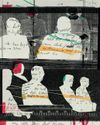
What does conspicuous consumption smell like? On a December afternoon in 2013, the Parisian perfumer Francis Kurkdjian was scheduled to meet with the renowned French crystal manufacturer Baccarat at the company’s chandelier-crammed headquarters, near the Arc de Triomphe. The C.E.O. at the time, Daniela Riccardi, had commissioned Kurkdjian to create a limited-edition fragrance to mark the company’s two-hundred-andfiftieth anniversary. Baccarat planned to produce two hundred and f ifty diamond-cut crystal flacons of the new perfume, priced at three thousand euros each, and wanted the scent to reflect the quality and opulence of its vessel.
Kurkdjian (pronounced “cur-zsan”) is a fifty-five-year-old of Armenian descent, with close-cropped hair, smooth manicured hands, and Clooneyesque salt-and-pepper stubble. During three decades in the luxury-fragrance industry, he has created such hits as Narciso Rodriguez for Her, Burberry Her, and Jean Paul Gaultier Le Male. He is the head of his own perfume company, Maison Francis Kurkdjian, and since 2021 has also served as the perfumecreation director for the fashion house Christian Dior, a job that involves reinventing such storied scents as J’Adore and Miss Dior. (Both Dior and Maison Francis Kurkdjian are subsidiaries of the luxury conglomerate L.V.M.H.) For Baccarat, Kurkdjian had designed three samples riffing on scents that were popular at the time when Baccarat was founded. But he’d begun to have misgivings. “I was not happy about what I created,” he recalled recently. “I felt it was too old-fashioned.” As he was about to leave his office, he opened a drawer where he keeps what he calls his “hidden treasures”—perfumes he’s created that have never been bottled—and picked up a vial labelled “HEVA.”
Denne historien er fra September 23, 2024-utgaven av The New Yorker.
Start din 7-dagers gratis prøveperiode på Magzter GOLD for å få tilgang til tusenvis av utvalgte premiumhistorier og 9000+ magasiner og aviser.
Allerede abonnent ? Logg på
Denne historien er fra September 23, 2024-utgaven av The New Yorker.
Start din 7-dagers gratis prøveperiode på Magzter GOLD for å få tilgang til tusenvis av utvalgte premiumhistorier og 9000+ magasiner og aviser.
Allerede abonnent? Logg på

GET IT TOGETHER
In the beginning was the mob, and the mob was bad. In Gibbon’s 1776 “Decline and Fall of the Roman Empire,” the Roman mob makes regular appearances, usually at the instigation of a demagogue, loudly demanding to be placated with free food and entertainment (“bread and circuses”), and, though they don’t get to rule, they sometimes get to choose who will.

GAINING CONTROL
The frenemies who fought to bring contraception to this country.

REBELS WITH A CAUSE
In the new FX/Hulu series “Say Nothing,” life as an armed revolutionary during the Troubles has—at least at first—an air of glamour.

AGAINST THE CURRENT
\"Give Me Carmelita Tropicana!,\" at Soho Rep, and \"Gatz,\" at the Public.

METAMORPHOSIS
The director Marielle Heller explores the feral side of child rearing.

THE BIG SPIN
A district attorney's office investigates how its prosecutors picked death-penalty juries.

THIS ELECTION JUST PROVES WHAT I ALREADY BELIEVED
I hate to say I told you so, but here we are. Kamala Harris’s loss will go down in history as a catastrophe that could have easily been avoided if more people had thought whatever I happen to think.

HOLD YOUR TONGUE
Can the world's most populous country protect its languages?

A LONG WAY HOME
Ordinarily, I hate staying at someone's house, but when Hugh and I visited his friend Mary in Maine we had no other choice.

YULE RULES
“Christmas Eve in Miller’s Point.”